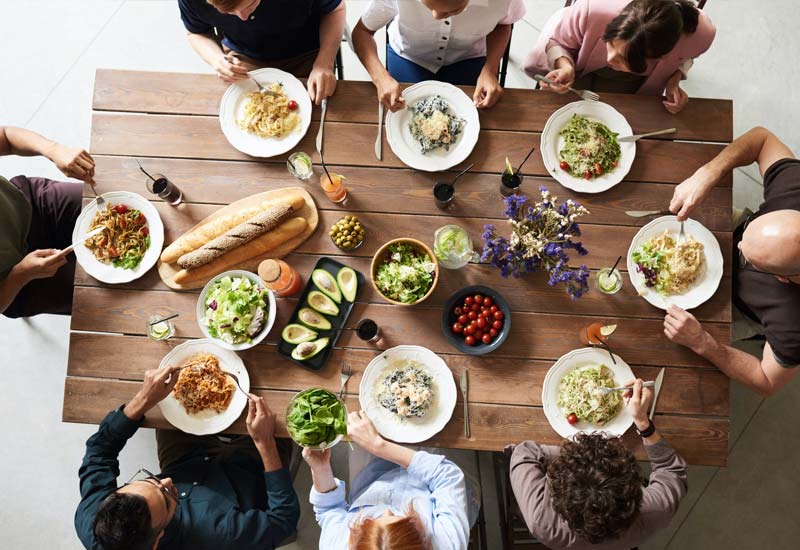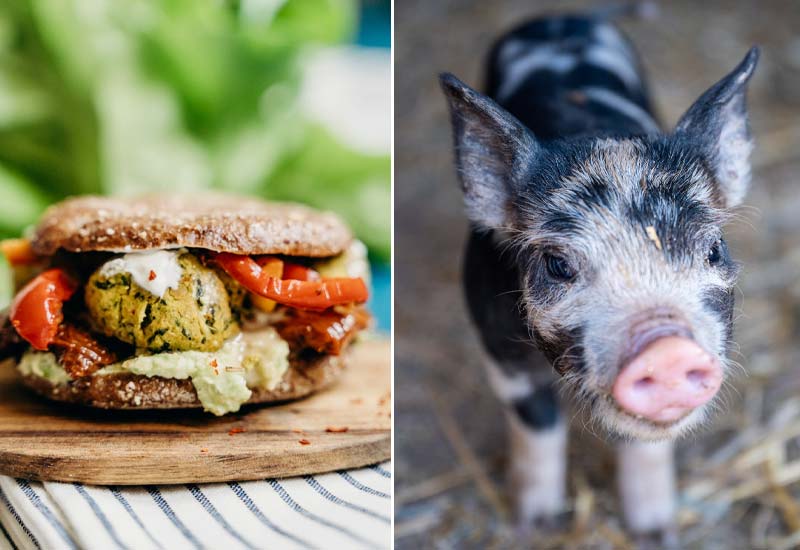Tired of the contentious topic of veganism and want to know the best way to communicate with family and friends when the topic comes up? Then you've come to the right place! Talking about your decision for a plant-based diet or a vegan lifestyle can be quite emotional and exhausting!
Especially if you have to justify yourself and are met with incomprehension, rejection or even ridicule from family and friends. So what is the best way to communicate in order to avoid an emerging dispute? And how can you convince others of veganism in everyday conversations instead?
In this article, I would like to give you the most important tips and advice for a successful communication of your vegan lifestyle in your family or circle of friends. By the way, it doesn't matter whether you've been vegan for a week or a decade - and whether you're rather shy or particularly eager to debate. Let's go!
Here you can find a short overview in advance:
Dangers: Why is veganism such an explosive controversial topic in the first place?
Headlines like "Vegan Bride Invites Meat-Eating Family Out!" we've all read before. But why is the vegan lifestyle such a contentious issue in the first place?
Those who do not live vegan feel in the presence of Veganer:innen usually quite annoyed. First of all, because one's own diet is questioned. And vice versa it is no different. Meat eaters and also vegetarians usually say again and again the same annoying sentences that vegans:inside then have to listen to repeatedly. For example, "You don't know what you're missing!" or "Lettuce shrinks your biceps!". This also questions the nutrition or lifestyle in the opposite role.
So the topic of conversation is already quite explosive by nature. Most of the time, however, people are even forced to talk about the subject. Especially at the dinner table with family and friends, where it can be completely avoided in the rarest of cases that the topic of veganism is "dished up". This urge then usually charges the mood even further and, as experience has shown, opens up a solid exchange of arguments.
Communication types: How do vegans talk about their lifestyle?

Unfortunately, there is no one complete solution as to how to ideally talk about the "popular" argument topic of veganism with family and best friends. Whether the dispute escalates or whether you can smoothly get around it depends on certain factors. Above all on which Personality and communication type one is oneself.
Here I would like to introduce them to you first, before we go straight to how you tell your trusted circle most purposefully about the fact that you are vegan:in. Classify yourself to then benefit from the most ideal solution for you.
Type 1: agreeable, shy, peace-keeping
If you don't mind other people consuming meat or other animal products at the table, if you've just gone vegan, if you're not big on defending the pro-vegan decision, or if you're more of a shy, argument-avoiding character, you should classify yourself with this personality type.
Type 2: unpleasant, protective, peacekeeping
Or maybe you're not afraid to have a factual discussion and speak up for animal rights in a calm tone. If you have a thick skin and can control your emotions, you are more likely to be this type of communicator.
Type 3: unpleasant, uncompromising, principled
You know you can't just sit there when someone is eating animal body parts right in front of you? Dead animals on your plate stir you up emotionally, so that it definitely comes to an argument with family and friends when you go out to eat together and you are asked about the topic? Then you rather belong to this third personality type with regard to veganism.
Notice: Animal rights activist Joey Armstrong introduced me to the video embedded here inspired me to make this little written "survival guide" on the subject. The classification of communication types comes from him, I just found it extremely fitting.
Best case: How do you have a factual and purposeful conversation with family and friends about veganism?
So now the discussion about the controversial core topic is open - and you are vegan and in the middle of it. Often this is a pretty annoying situation, I know! But in principle there is nevertheless for each personality type mentioned a suitable approach, in order to master the controversial topic veganism in personal discussions skillfully.
Have you assigned yourself to a personality type? Then here's the best advice for talking to others about your decision to go vegan or convincing others to do so.
Type 1: You count yourself among the compatible, shy, peace-keeping vegans?
Then it is advisable to talk as discreetly as possible about your vegan meal when you are approached. Phrases like "I didn't want to eat animals anymore because I feel sorry for what happens to them" or "I have the Documentation Dominion seen about the treatment of animals" are short and effective and can avoid an argument. However, it is then also important to change the topic of conversation again relatively quickly.
You don't feel so confident in a vegan discussion or just want to bypass it? Then it is particularly recommended as a rule, that you let the food speak for you. Cook an extremely delicious vegan dish that really convinces everyone. This is how you open the door to a plant-based diet for many people.
Important: Accusatory sentences, as well as all your Reasons for being vegando not belong at the table! Break them down to the core aspect "animals" and have breakfast the topic instead if possible with a sentence.
Type 2: You count yourself among the unpleasant, protective, peace-keeping vegan:in?
Then as a basis is advisable to family and friends convince with a really unbeatable food and a polite one at that, well-founded statement for your decision to serve, making clear and explicit the connection between meat, eggs, cheese and other animal foods and the animals themselves.
If you encounter counter-interest, you can ask questions that go deeper into the topic. For example, how does your counterpart cruelty to animals stands. And even then, if you perceive a certain defensiveness, you can still tell about it from the first person perspectivehow you came to the decision. So you can master the contentious issue of veganism and the Help animals, ohne die Stimmung am Tisch ruckartig zu kippen. 😉
However, remind yourself where you are coming from in every conversation! Finally, it is always advisable to have some suitable books or vegan documentaries that have convinced you personally. This way, as your interviewer, you don't feel pressured and you can make up your own mind about the corresponding recommendation.
-
Cookbook Vegan cliché goodbye!20 €
-
Eat animals13 €
-
Vegan is nonsense!24 €
Type 3: You count yourself among the unpleasant, uncompromising, principled vegans?
Then it is absolutely recommended to tell your family and friends about the fact that you feel extremely uncomfortable sitting at a table where animals are being eaten. That way, everyone can be prepared and no arguments will break out. Maybe there will even be purely plant-based dishes for everyone - or you simply joins in after the meal. Real friends respect that.
Do you consider yourself to be one of these communication types? Then you can also simply cook for family and friends yourself or avoid eating together with non-vegans. Instead, you can switch to other joint activities to avoid burdening friendships and relationships with this emotional topic.
Controversial issue of veganism: A tightrope act in the service of animals

Yes, veganism is a contentious topic - but conversations about it don't have to end in argument. When you talk about your decision, speak from your perspective and help others understand and better empathize with the suffering of animals. After all, it's a massive injustice - and a role none of us would like to be in.
But you don't have to talk about it either! Especially not if your counterpart (whether family member, friend or stranger) is absolutely closed and only robs you of energy. In such cases, it is always recommended to change the topic of conversation. But you can also recognize real friendships by the fact that they don't Discussion topic zerbrechen. 😉
I hope that I was able to give you some valuable tips to make communication about veganism in your personal environment more pleasant, more purposeful and less stressful. Do you have any questions or suggestions? Is veganism also a contentious topic in your family or circle of friends? Then feel free to write me in the comments how you deal with it.
Be always kind to animals,

PS.: You want to do more for the animals? Then learn in the linked article, how to become an animal rights activist. There you will learn techniques and approaches that will also help you in everyday conversations.








